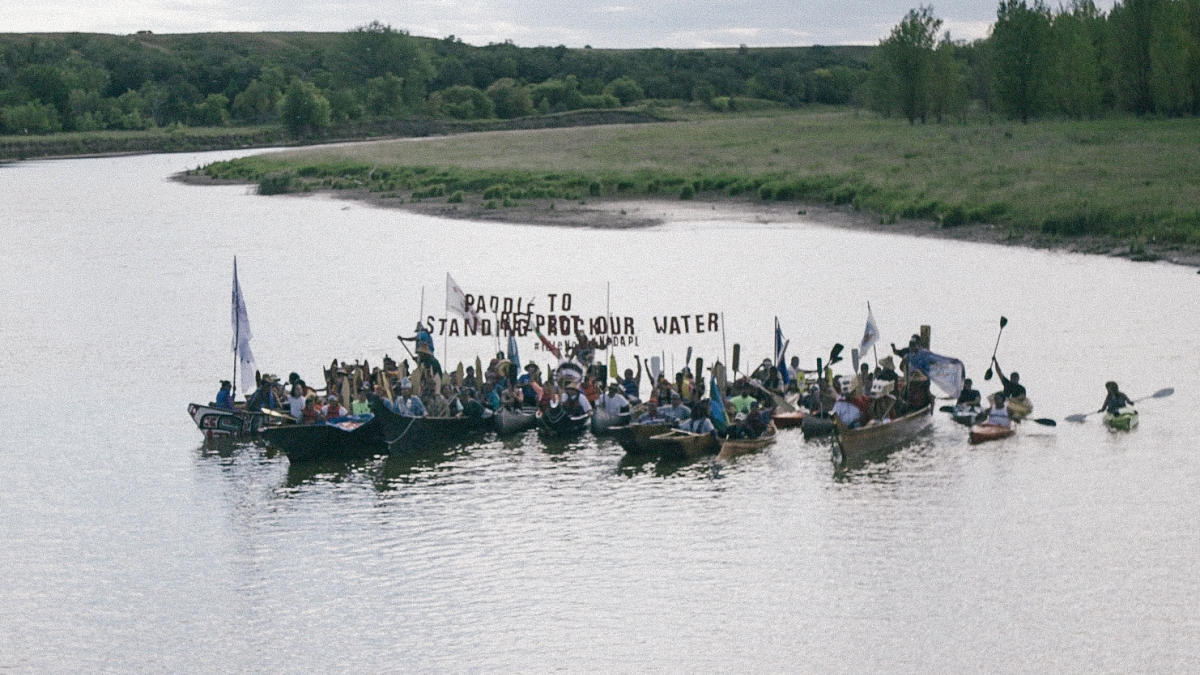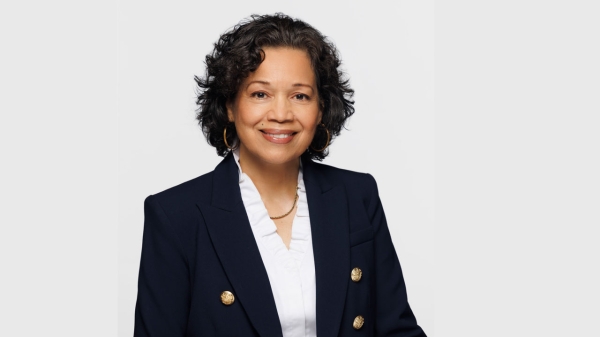Human Rights Film Festival at ASU aims to reach not just the head but the heart
Free 3-day event to feature documentaries on people at risk in the US; panel discussions to feature filmmakers, experts, advocates

Heated rhetoric and finger-pointing dominate U.S. politics and headlines. But what happens to the people whose stories don’t make the news but whose lives are deeply affected by policy choices?
Arizona State University’s Human Rights Film Festival takes a closer look at these overlooked people.
“Film is a powerful way to convey experience,” said festival founder and director LaDawn Haglund. “It transcends an intellectual understanding of an issue to reach people’s hearts.
“With human rights violations, this is so important because statistics and facts make us numb rather than outraged, which is how we must feel — at least momentarily — if we want to create a world where such violations are stopped.”
This year, the free festival features documentaries about issues in the United States, such as the struggles of undocumented immigrants, reproductive rights and conflicts over the Dakota Access Pipeline and the history of indigenous struggles over land and resources.
Those topic areas were shaped by the interests of the ASU student team helping to put on the festival, part of a for-credit internship.
For Matt Hernandez, who will graduate next month with a bachelor’s in family and human development with a certificate in human rights, working on the festival increased his interest in the field.
“It’s broadened my scope of topics I’m interested in,” said Hernandez, who will be attending law school to study international law with an emphasis on human rights. “There are things I haven’t considered that fall under the umbrella of human rights — specifically, economic mobility and homelessness.”
The films at the festival will be coupled with Q&A sessions in which audience members will have a chance to speak directly with filmmakers, activists and experts “so they are not simply passive receivers of information,” Haglund said. “This hopefully will also spur people to act in defense of human rights, something the world sorely needs.”
Two panelists of note are U.N. Ambassador Crispin Gregoire, who has worked with the U.N. secretary general on the World Conference on Indigenous Peoples and who will discuss conflicts over indigenous rights and the extractive industry; and award-winning director Maxim Pozdorovkin, who will discuss his most recent film, “Clinica de Migrantes.”
The festival, now in its seventh year, was conceived as a way to “complement the intellectual learning that students receive with a deeper connection to the people who are suffering in the world,” said Haglund, an associate professorHaglund is also a senior sustainability scholar at the Julie Ann Wrigley Global Institute of Sustainability and a faculty fellow at the Center for Law and Global Affairs, Sandra Day O'Connor College of Law. of justice and social inquiry in the School of Social Transformation. She talked with ASU Now about human rights and film.
Question: Is there an increasing need to take a closer look at these issues in today’s political environment?
Answer: There is no doubt that the founding principles are still at play today. We have become so numb to the suffering of others that we hardly stop to care, or to feel that it hurts us too. If we can’t feel for others, our whole society is degraded and a politics of hate and division becomes easier to maintain.
Q: What is the power of seeing something on film, as opposed to on the nightly news?
A: We try to choose films that touch the heart, but that also are told objectively. This is not always easy, because in the case of human rights violations, there is often no “equally valid viewpoint” of a violator of human rights. There is something wrong when basic human rights are violated, though it is important to understand what drives these violations. Film can also better convey the complexity of an issue, which is almost impossible in a two-minute news story.
Q: Do you choose the topics first, or the films?
A: This year, we chose the topics specifically to address human rights violations in the United States. People in this country often believe (falsely) that human rights violations don’t happen here; human rights are for other countries like China and Sudan. But the shameful truth is that millions of people experience conditions on our soil that constitute human rights violations, according to international human rights treaties, conventions and declarations, several of which we have signed. CERD (on racial discrimination) and DRIP (on the rights of indigenous peoples) are two good examples, and violations of both are featured in our lineup of films.
Q: Do documentaries tend, by their nature, to be more skewed toward activism and the liberal end of the spectrum?
A: This is an interesting question. What does it mean to be “liberal”? If believing that human rights should be respected is a liberal concern, then by definition, a human rights film festival is going to be “liberal.” I think calling this “skewed,” however, is like saying believing in the rule of law makes you biased. Bias toward human rights is not a political viewpoint; it is a moral commitment. To say this is skewed is a bogus claim made by people who perhaps have not yet discovered the moral conviction and compassion for the suffering of others to yearn (and fight) for a more just world.
Q: Which of this year’s films surprised you, and why?
A: It is difficult to surprise me with human rights, as I teach about them for a living. However, I will say I was fairly disturbed by the militarization of policing that is documented in “Do Not Resist.” It is such a direct attack on the fundamental civil rights of people who are swept up in the frenzy of SWAT-like policing; all people of sane mind should be disturbed by it. I don’t think people realize how bad it is. Of course, when the main victims are demonized and categorized as deserving of this treatment because of their race or where they live, it is again hard to get people to empathize. Racism has that ugly side that demeans us all.
Q: Which of the films do you predict might stir the most discussion after?
A: I think they all are fairly provocative (or we haven’t done our job). It will depend on who attends, as well, as some people will not accept the reality that is portrayed about immigrants, or abortion, or militarized policing, or poverty and homelessness, or indigenous rights and the destruction of the environments in which Native communities live. But it is good to have these discussions and air the different perspectives so that we can arrive at a place where more sane and humane policies become possible.
Q: One of the main benefits of film festivals is the Q&A after each film, the interaction with the filmmakers and experts themselves. In previous years, what were some memorable post-film discussions?
A: There have been so many memorable moments. The first year we did the festival, we organized a session focused on (former Maricopa County Sheriff) Joe Arpaio’s immigrant raids on businesses. We were fortunate to include a young girl whose parents had been snatched up, as well as her parents! That was very memorable and moving. During the third year, we invited Academy Award-nominated director Mark Kitchell to discuss his wonderful film “A Fierce Green Fire,” about the history of environmental justice movements in the United States. It was a huge crowd, and the discussion was very rich and inspiring.
Q: Can you talk about some of your recent research into the social and political dimensions of sustainability, and how that touches on human rights?
A: My work is on the human right to water, which actually exists in constitutions or laws in many countries. My research examines what happens in difficult urban environments when people’s human right to water and sanitation is violated because of inadequate services, inadequate funding, poverty, or mismanagement, in particular when those claims wind up in court.
It is hard for many of us to imagine what it is like to go without water — think of not being able to shower, ever. Or not having water to flush a toilet. Or not having a toilet at all. These are the real conditions people face in many places, and it is not a matter of opinion whether people should have access to these public goods. It is a moral imperative. But how that actually happens is where it becomes complicated. We had a situation in Flint, Michigan, where people have been denied this basic right, and it will be interesting to see if any of the people responsible for making those communities suffer like that will have to take any responsibility for it.
Q: What do you hope students will take away from the film festival?
A: I hope students can become softer and more open to seeing the consequences of polarization, demonization of “others,” and carelessness in the face of suffering. I hope it will spur them to look deeper than the headlines or their Facebook feeds to understand their society — and to want to make it better.
Human Rights Film Festival
What: A three-day film festival, open to the public, that aims to engage ASU and the greater community in a discussion of human rights issues through film. This year’s event will focus on documentaries about human rights at risk in the United States.
When: 4–6:30 p.m. Friday, April 7; 10 a.m.–5 p.m. Saturday, April 8; 10 a.m.–1:30 p.m. Sunday, April 9.
Where: College Avenue Commons auditorium, 660 S. College Ave., Tempe. Find a campus map here.
Admission: Free, and light refreshments will be served.
Details: Find the schedule of films at https://humanrights.asu.edu/content/human-rights-film-festival
Top photo: A screenshot "Red Power: Standing Rock, Part II," part of the film collection "Rise." Two episodes of "Rise" will be shown at the festival, including "Red Power." Courtesy of Vice Media
More Law, journalism and politics

CBS News president to give keynote address at Cronkite School’s spring convocation
Ingrid Ciprián-Matthews, president of CBS News, will serve as the keynote speaker at Arizona State University’s Walter Cronkite School of Journalism and Mass Communication spring 2024 convocation. …

School of Politics and Global Studies director's new book explores mass violence
Why do people commit atrocities and why are certain groups, including religious and ethnic, more vulnerable to large-scale violence? These questions are explored in a new book by Güneş Murat Tezcür…

ASU faculty contributing to improvement of Wikipedia
Many academics have a love-hate relationship with Wikipedia. While the website has information about almost anything you can imagine, the credibility of that information is sometimes suspect. Tracy…